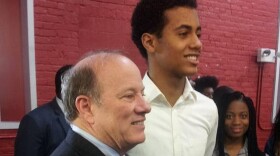How do you decide if a so-called “failing” school should shut down, and is there a right way to do it?
Three Detroit charter schools shut their doors forever at the end of this school year.
One of them, Allen Academy, was one of the city’s very first charters. And its closure leaves a wake of upheaval.
"The kids are going to be better off"
The ornate, red-brick complex on Detroit’s west side is unmistakably an old Catholic church.
The Saint Theresa of Avila parish closed in the 1980s. Since 1999, it’s been Allen Academy.
But Allen Academy is now closing too. As early summer light poured through the stained glass windows, a few people milled around folding tables scattered around the old nave, talking to representatives from a handful of other charter and traditional public schools in Detroit.
“The idea was that parents and kids could come in here, they could meet with all the various schools, they could find a program that would match the kind of learner that they are, and they could find a good spot for next year,” said Buddy Moorehouse, a spokesman for the Michigan Association of Public School Academies.
MAPSA put together this enrollment fair in late June, after Allen Academy’s charter authorizer, Ferris State University, declined to renew its contract.
The reason given: consistently low academic performance.
Moorehouse admits that closing a school is always tough, but says it’s the right choice in this case. “The kids are going to be better off if they move to one of these schools. It’s really that simple,” he said.
Sandra Martin was there promoting the Detroit Merit Academy. It’s another charter school located way across town, on Detroit’s far east side.
It has a handful of open seats. But Allen Academy had nearly 900 K-12 students, and Martin says it could be tough for all of them to find good schools on such short notice.
“It seems like ill timing to me,” Martin said. “I actually didn’t even know the school was closing. Apparently their staff didn’t either until a week prior to.”
Late notice leaves some parents scrambling
A lot of Allen parents didn’t know it was coming, either — though they’d known for months that it could happen.
Iris Stewart, who had a fifth and a ninth-grader at Allen, says families kept getting conflicting information.
“The coach say that they are gonna be ok, we good. And then I hear, I see it on Instagram. And I’m like, 'Oh my goodness, really?'” she said.
That’s right: Stewart got official word of the closing from her son, who saw it on Instragram.
Stewart has mixed feelings about it. She thinks the school may have “run its course,” but she’s not happy about scrambling to find new schools at the last minute.
Allen parent Tamara Brown was prepared, though. She’s already enrolled her son in several other schools.
But Brown says Allen Academy meant a lot to her. Her daughter graduated from the school, and is now about to graduate from college.
While Brown admits things had gone downhill, she thinks it had the capacity to rebuild.
“I don’t think shutting it down was the best way to go,” Brown said. “Especially since this is a struggling community, and this was pretty much the only school that was in this area.”
A failed turnaround
Allen Academy’s final reauthorization review fleshes out just how things went bad. It shows a school that was in serious trouble, and knew it.
At the end of the last school year, the board made some drastic moves to try and reverse course.
That included cutting some ties with the school’s long-running, for-profit management agency, The Leona Group, and farming out school services to several different companies.
But the result was chaos. The school went from a $1.8 million fund balance to nearly $1 million in debt in just six months.
Staff left in droves, with many vacancies filled by uncertified teachers. The superintendent resigned, and the school’s already-poor test scores fell to rock-bottom.
No clear guidelines can mean confusion, profit
Charter school proponents say the decision to close the school is an example of accountability in practice.
They point out that low-performing traditional public schools almost never shut down, but charters have the flexibility to make that happen.
But researchers say very few charter schools close just for academic reasons.
“Those schools often happen to be the schools that are performing poorly, but the thing that kind of starts the process often isn’t their poor performance,” said Gary Miron, a professor of education at Western Michigan University who has studied the charter sector for years.
Miron thinks Allen probably should have closed years ago. But he says there’s a lot we just don’t know about how best to make that decision, or how to handle the closing process.
There are no mandated transition times, no real state guidelines about how to close a school.
And Miron says when it comes to charter schools in particular, the question is not just what happens to families and communities, but what happens to the school and its assets.
“Oops. We thought this was a public school. It’s privately owned … the equipment, the desk, everything has been purchased with public dollars, but it’s all private property,” he said.
Allen Academy’s board must create a “dissolution, liquidation and winding-up plan” spelling that out.
But it still leaves hundreds of families in limbo, without a neighborhood anchor of nearly a century.
They have to hope that one school official was wrong about this prediction: “If you close the school, you sign a death certificate for the community.”
Support for the Detroit Journalism Cooperative on Michigan Radio comes from the John S. and James L. Knight Foundation, Renaissance Journalism's Michigan Reporting Initiative, the Ford Foundation and the Corporation for Public Broadcasting.






